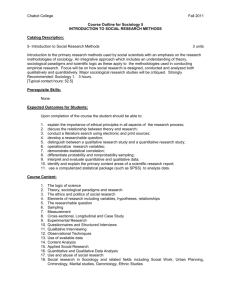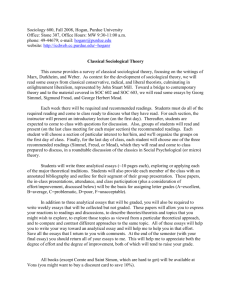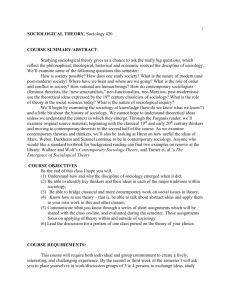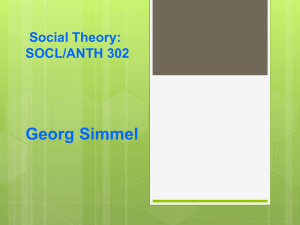Course Aims and Objectives
advertisement
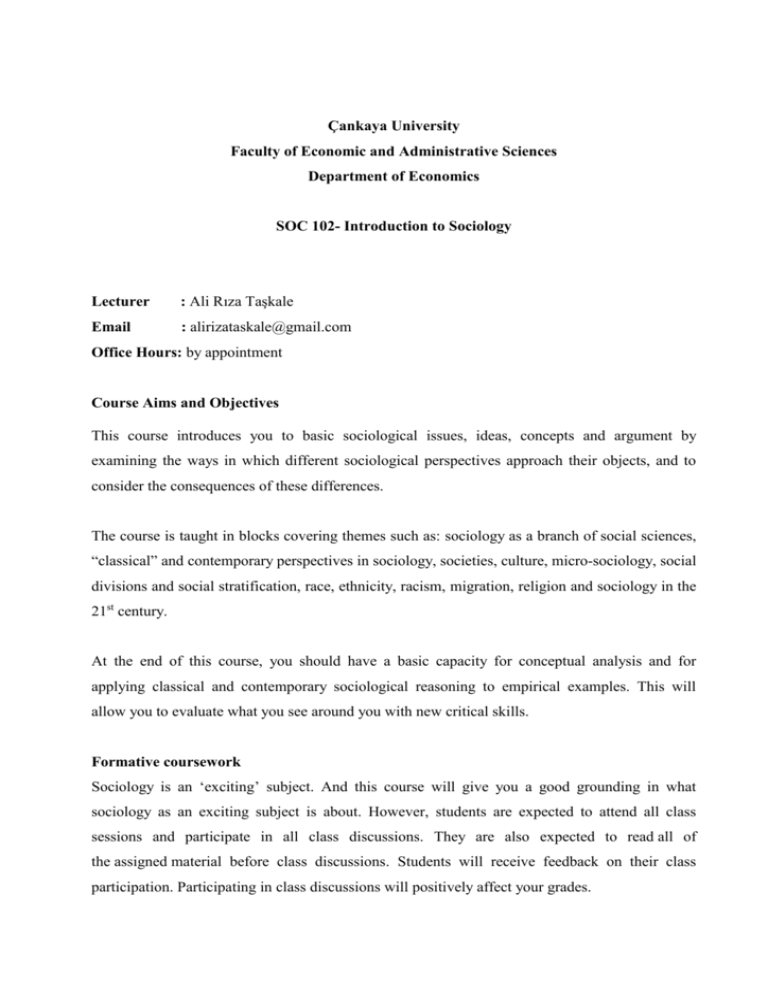
Çankaya University Faculty of Economic and Administrative Sciences Department of Economics SOC 102- Introduction to Sociology Lecturer : Ali Rıza Taşkale Email : alirizataskale@gmail.com Office Hours: by appointment Course Aims and Objectives This course introduces you to basic sociological issues, ideas, concepts and argument by examining the ways in which different sociological perspectives approach their objects, and to consider the consequences of these differences. The course is taught in blocks covering themes such as: sociology as a branch of social sciences, “classical” and contemporary perspectives in sociology, societies, culture, micro-sociology, social divisions and social stratification, race, ethnicity, racism, migration, religion and sociology in the 21st century. At the end of this course, you should have a basic capacity for conceptual analysis and for applying classical and contemporary sociological reasoning to empirical examples. This will allow you to evaluate what you see around you with new critical skills. Formative coursework Sociology is an ‘exciting’ subject. And this course will give you a good grounding in what sociology as an exciting subject is about. However, students are expected to attend all class sessions and participate in all class discussions. They are also expected to read all of the assigned material before class discussions. Students will receive feedback on their class participation. Participating in class discussions will positively affect your grades. Textbook Macionis John J (2010) Sociology (13th edition). London: Pearson Supplementary Book (optional) Bauman, Zygmunt and Tim May (2001) Thinking Sociologically, rev. edn. Oxford: Blackwell Turkish translation available: Bauman, Zygmunt (2010) Sosyolojik Düşünmek, İstanbul: Ayrıntı Yayınları Grading Two midterms and a final exam, all of which weigh as follows: Midterm I : 25 % DATE TBA Midterm II : 25 % DATE TBA (Film Analysis) Final : 50 % DATE TBA 2 Course Schedule and Readings Week 1: Introduction Week 2: “The Sociological Perspective,” pp. 2-25, C. Wright Mills (1950), “The Promise of Sociology”, from the Sociological Imagination Week 3: “Sociological Investigation”, pp. 26-55 Week 4: “Culture”, pp. 56-85 Week 5: “Ideology”, pp. 104-130, Terry Eagleton (1991), “What is Ideology”, in Ideology, London, Verso Week 6: “Societies,” pp. 86-109 Week 7: No Class >> Midterm---Midterm---Midterm----Midterm Week 8: “Social Interaction in Everyday Life,” pp. 136-159 Week 9: “The Metropolitan Mind”: Georg Simmel: Georg Simmel (1903), “The Metropolis and Mental Life”, in Georg Simmel: On Individuality and Social Forms, ed. Donald Levine, Princeton, NJ, Princeton UP 3 Week 10: “Social Divisions and Social Stratification,” pp. 246-271 Week 11: “Race and Ethnicity,” pp. 354-383 Week 12: The Panopticon Society and Surveillance: Michel Foucault (1977), “Panopticism”, in Discipline and Punish: The Birth of the Prison, Penguin, London, pp. 195-228 Week 13: “Collective Behaviour and Social Movements”, pp. 598-623 Week 13: Course Summary Concluding Remarks 4








